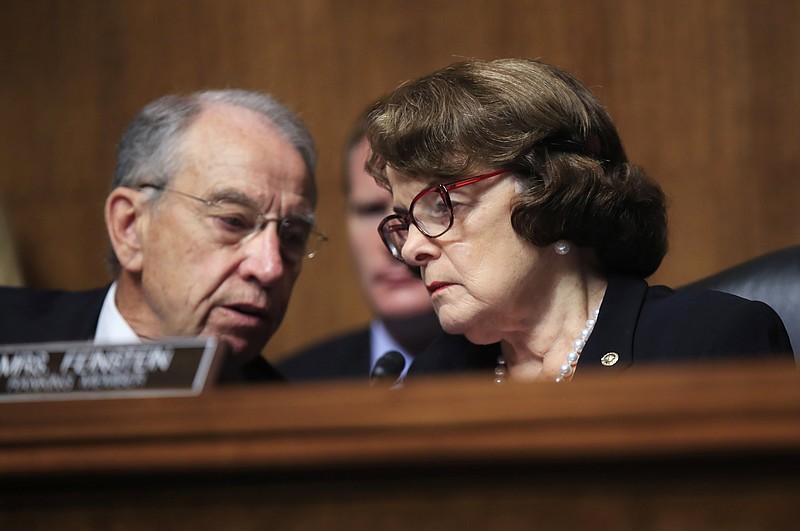University presidents usually fall over themselves trying to steer clear of anything that might show partiality to conservatives, but the presidents of Princeton and Notre Dame universities recently wrote letters objecting to the confirmation hearing treatment of a nominee to the U.S. Circuit Court of Appeals by Republican President Donald Trump.
The nominee, Notre Dame law professor Amy Barrett, was questioned about her faith by Democrat senators Dick Durbin of Illinois, Dianne Feinstein of California, Al Franken of Minnesota and Mazie Hirono of Hawaii.
"Because religious belief is constitutionally irrelevant to the qualifications for a federal judgeship," Princeton President Christopher Eisgruber wrote to Feinstein and Senate Judiciary Committee Chairman Chuck Grassley, R-Iowa, "the Senate should not interrogate any nominee about those beliefs. I believe, more specifically, that the questions directed to Professor Barrett about her faith were not consistent with the principle set forth in the Constitution's 'no religious test' clause."
Beginning with the Supreme Court nomination of Robert Bork by President Ronald Reagan more than 30 years ago, Democrats have increasingly subjected Republican federal judge nominees to a worldview test. Then, by their remarks, and often by their votes, Democrats often vote against the judicial nominees if they do not share that worldview.
The questions in question this time had to do with Barrett's Catholic faith.
"Do you," asked Durbin, "consider yourself an orthodox Catholic?"
Article VI of the United States Constitution is very clear. "[N]o religious test," it says, "shall ever be required as a qualification to any office or public trust under the United States."
"When you read your speeches," Feinstein said, "the conclusion one draws is that the [Catholic] dogma lives loudly within you. And that's of concern when you come to big issues that large numbers of people have fought for for years in this country."
Without asking Barrett the actual questions, the octogenarian senator was signaling her concern that the nominee might hold views consistent with her Catholic faith - against abortion and against same-sex marriage - and might be willing to overturn current law on the issues.
It's Feinstein's right to examine the nominee's judicial philosophy but not to intertwine it with her faith.
Specifically, Barrett had written in the Marquette Law Review, examining what Catholic judges should do in death penalty cases, that judges faithful to church teachings "are morally precluded from enforcing the death penalty." She further said if a judge in good conscience is unable to follow the law in such a case, she should recuse herself and let another judge decide the case.
The senators, Durbin, a Catholic himself, and Feinstein, who attended a Catholic high school, or those aides who prepared questions for them, shouldn't have tried to cherry-pick the article, "Catholic Judges in Capital Cases." When they did, they missed the nominee's thorough explanation and even her emphatic first-page statement saying that "the general public are entitled to impartial justice."
Of course, the same senators hadn't asked similar religious questions of former President Barack Obama's last two Supreme Court nominees, Elena Kagan, a Jew, or Sonya Sotomayor, a Catholic.
During the same hearing, Franken asked Barrett - a former law clerk for the hated-by-the-left late Supreme Court Justice Antonin Scalia- about speaking honorariums she received from the religious-liberty nonprofit Alliance Defending Freedom, an organization Franken compared to former Cambodian dictator Pol Pot, whose regime was the cause of death of some 1 to 3 million people.
"I question your judgment," he said.
Sen. Bernie Sanders, I-Vt., had leveled a similar religious attack earlier this summer on Russell Vought, then the nominee as deputy director of the Office of Management and Budget. He was upset that in an article Vought authored he was critical of the often repeated phrase of everyone worshiping the same God.
"What about Jews?" the socialist senator asked. "Do they stand condemned, too?"
Although the recent religious attacks have brought criticism from Republicans ("some of the questioning seems to miss some of these fundamental constitutional protections" - Sen. Ben Sasse, R-Neb.), Democrats ("embarrassing for a nation that's one-fourth Catholic" - Christopher Hale, a former Obama staffer), college presidents and religious leaders, they're not likely to stop. Because, as Sen. Mike Lee, R-Utah, said on the Senate floor the day after the hearing, it's not religion that's the problem.
"These strange inquisitions," he said, "have nothing to do with the nominees' competency, patriotism, or ability to service Americans of different faiths equally."
They'd be unthinkable to our Founding Fathers, too. The Rev. John Jenkins, president of Notre Dame, suggested such in his letter to Feinstein.
"Indeed," he wrote, "[the dogma of one's faith was] lived loudly in the hearts of those who founded our nation as one where citizens could practice their faith freely and without apology."
No, we simply don't believe it squares with the Democrats' current worldview. Today, it's their way or the highway. Period.
